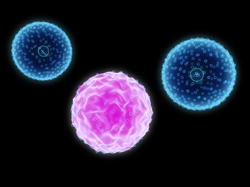Epigenetic therapy of cancer
The concept of genetic mutations leading to the formation of cancer is well established. Accumulating evidence shows that apart from alterations in the DNA sequence of cancer cells, epigenetic modifications occurring after DNA replication may also play a part in carcinogenesis.These modifications can take the shape of DNA methylation – addition of a methyl group at a particular sequence – or alteration of the DNA-interacting proteins known as histones. Chromatin remodelling events (acetylation, phosphorylation, methylation) regulate gene expression, often altering the cell phenotype and behaviour. The demonstration of the clinical anti-cancer effect of histone deacetylase inhibitors (HDACi's) has provided proof-of-principle for the potency of epigenetic drugs. Alongside that line of thought, the EU-funded ‘Epigenetic treatment of neoplastic disease’ (Epitron) project aimed to define and validate the concept of epigenetic cancer treatment. In particular, project scientists investigated the mechanism of anti-leukaemic action of epi-drugs by focusing on acute myeloid leukaemia (AML) and extending their findings to other cancers. Special emphasis was put on the selective activation of the TNF-related apoptosis-inducing ligand (TRAIL) signalling pathway by known and newly generated epi-drugs in vivo. Through the development of novel mouse models, it was also possible to study and report the activation of other anti-tumour pathways following epi-drug treatment. A genome-wide epigenetic search for novel epi-targets with emphasis on leukaemia and leukaemogenic oncoproteins could help advance current AML treatment options. Extension of Epitron work to solid tumours is expected to further uncover the basis of cancer-selective apoptosis and provide novel types of validated tumor-selective weapons.







